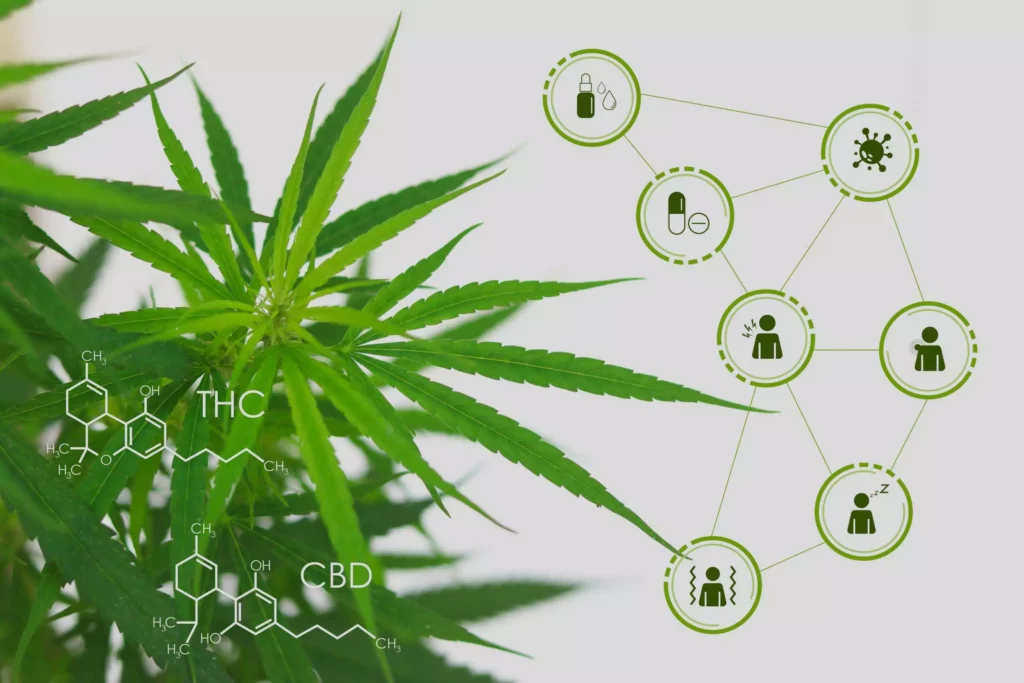Exploring the Health Benefits of Cannabis: From Relief to Recovery

Cannabis, often shrouded in controversy and mystery, goes by many names—hemp, ganja, bud, flower, and 420. Today, let’s demystify cannabis and discuss its potential health benefits, which remain largely unrecognized amidst its complex legal status.
Understanding Cannabis
Cannabis, commonly known as marijuana, pot, or weed, is a robust plant capable of growing up to 20 feet tall. It features a stiff stem with glandular hairs that secrete active compounds affecting users. These leaves can be smoked in various forms such as joints or blunts, or consumed through edibles and vaping.
Key Compounds: THC and CBD
Cannabis contains numerous compounds, with THC (tetrahydrocannabinol) and CBD (cannabidiol) being the most significant. THC is known for its psychoactive effects, producing pleasure, memory, coordination, and the notorious “high.” CBD, on the other hand, offers therapeutic benefits without the psychoactive effects.
Legal Status of Cannabis
Federally classified as a Schedule 1 drug in the United States, cannabis has seen varying degrees of legalization across states, primarily for medical use. It’s crucial to understand your local laws regarding cannabis to navigate its use legally.
Health Benefits of THC
- Pain Relief: THC is effective in alleviating chronic pain associated with conditions like arthritis and cancer.
- Nausea Control: For chemotherapy patients, THC can significantly reduce nausea and vomiting when used in conjunction with prescribed medications.
- Muscle Spasm Reduction: THC has been found to decrease muscle spasms in conditions such as multiple sclerosis.
- Improved Sleep: THC can help users fall asleep quicker and enjoy a longer, uninterrupted sleep.
How Long Does THC Stay in Your System?
The duration THC remains detectable in your body varies based on usage frequency and method. It can be detected in saliva, urine, and blood tests for days to weeks after use, and in hair for up to 90 days.
Understanding CBD
CBD is a non-psychoactive component that offers a feeling of relaxation and pain relief without the high. It is available in several forms, including oils, capsules, and gummies.
Types of CBD
- Full Spectrum CBD: Contains all components of the cannabis plant, including up to 0.3% THC.
- Broad Spectrum CBD: Includes most cannabinoids found in the cannabis plant but does not contain THC.
- CBD Isolate: Pure CBD without other cannabinoids.
Health Benefits of CBD
- Anxiety and Depression Relief: CBD has been shown to help alleviate anxiety and depressive symptoms.
- Epilepsy Treatment: CBD oil is proven effective against certain rare forms of epilepsy, like Lennox-Gastaut Syndrome and Dravet Syndrome.
- PTSD Symptom Management: Used alongside therapy, CBD can help reduce PTSD symptoms.
- Addiction Recovery Support: CBD can decrease opioid cravings and help with addiction recovery.
- Pain Management: It is also beneficial in managing pain related to arthritis and cancer that has not responded well to other treatments.
- Neuroprotection: Due to its antioxidant and anti-inflammatory properties, CBD can offer protection against neurological diseases.
Duration of CBD in the Body
While CBD typically doesn’t show up on drug tests, improper manufacturing can lead to THC contamination. Depending on the frequency and form of use, CBD can remain detectable in the body from several hours to several days.
Cannabis, often dubbed the “devil’s lettuce,” holds promising potential for addressing a wide range of health issues. As research continues and legalization expands, understanding and utilizing cannabis responsibly can lead to significant health benefits, altering its reputation from a mere recreational drug to a medicinal ally.
